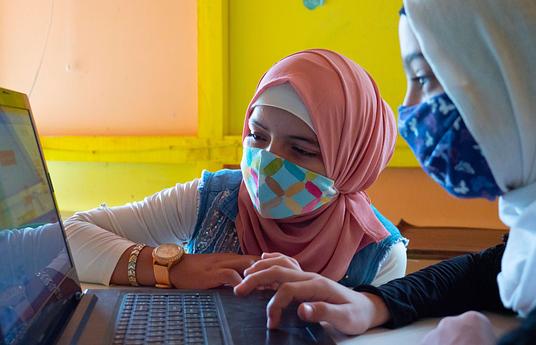Just 7% of refugees reach tertiary-level education, whilst the global average enrolment rate for young people is 42%. Research by UNHCR found that a lack of information and guidance leaves refugees unaware of how to access opportunities. It also affects secondary school completion: an evaluation of UN scholarships found awareness of opportunities to be a key motivator in completing school.
Students progress through a transformative exploration of interests and strengths, enabling them to identify suitable opportunities. They learn how to research and evaluate opportunities and scholarships. They develop skills for interviews, craft compelling CVs, motivation letters, and application essays. The Programme can be delivered in three ways: at a local learning centre with IT facilities; online remote workshops; or via WhatsApp with an AI-driven learning system.
By the end of the programme, students have enhanced knowledge and skills for access; they have a set of key documents and a plan for pursuing opportunities. Our impact data (statistically reliable with 99% confidence interval and 5% margin of error) tells us the Programme has consistent, statistically significant outcomes and impact. 91% of students reported that the Guidance Programme supported their application to university. Within just six weeks of the Programme finishing, 68% of the students have already used the skills and knowledge they gained. The programme supports not only academic and practical readiness, but also fosters resilience and sense of belonging, both essential foundations for long-term success, with a x5 increase the proportion of students having confidence and a sense of community.
A recent tracer study with programme alumni found that 75% of respondents reported sharing the guidance they received with their peers, highlighting significant secondary impact of guidance.
The programme fills an unaddressed gap in information and skills for young refugees by adapting content and approaches commonly used for global university guidance to the unique context of refugees.
The learning design of the Programme is purpose made to scale across contexts. The learning technology can be deployed at low cost and the content is easy to adapt: ‘windows and doors’ have been created throughout the curriculum to contextualise content to local contexts.
Refugee leadership is a core part of the GP delivery. Former students often become facilitators - we have trained 160 facilitators since 2019. 78% of facilitators report increased skills through their training and involvement in the GP. This model enriches the GP with lived experience, creates pathways for growth, and achieves sustained community impact.
A recent tracer study highlighted the ripple effect of the Programme, with 75% (n=24) of respondents reporting that they have shared the guidance they received with others to help them pursue to tertiary education. The depth of this engagement is reflected in the scale of outreach, with 54% of those who shared guidance reporting that they reached more than 20 people. These acts of knowledge-sharing have led to tangible outcomes, as participants described supporting others in accessing scholarships or university admissions.
Since 2023 we have developed an AI-driven WhatsApp based version to reach the most marginalised students who cannot attend synchronous classes due to work commitments.
Review information the Programme on Mosaik's website https://mosaik.ngo/programmes/ and contact hello@mosaik.ngo



